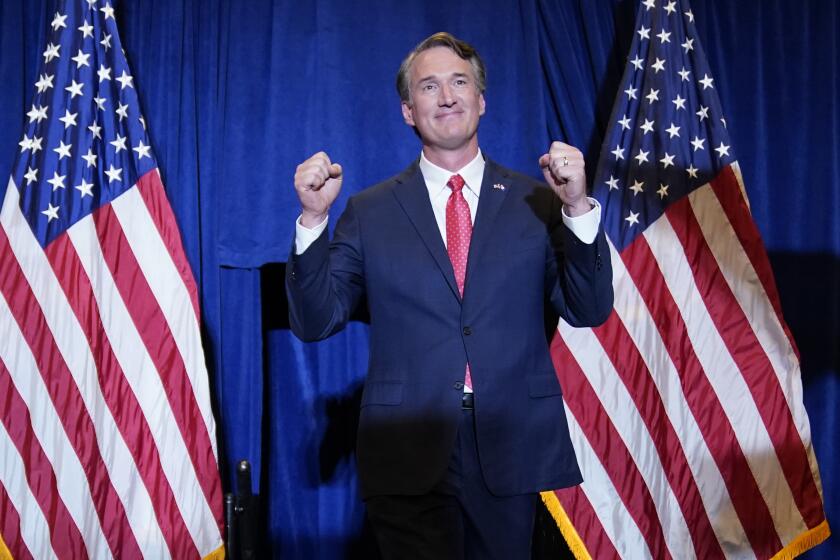Mitt Romney’s anti-union tone could haunt him later
Reporting from Grand Rapids, Mich. — As Mitt Romney seeks victory in his native state’s primary, he has made organized labor enemy No. 1. He has railed against union “stooges” and “bosses,” arguing that their demands nearly killed the auto industry and gravely wounded America’s competitiveness.
Romney’s message and his tone are popular talking points among Republican voters in most of the country, but they contrast sharply with the conciliatory statements he has made about labor in the past, particularly during his 2008 presidential campaign. His comments could haunt efforts by Romney and other Republicans to attract blue-collar workers and economically stressed voters in Michigan and nearby states.
“You get the sense Mitt Romney is only concerned about winning the primary and is not so concerned with winning Michigan in November,” said Ed Sarpolus, a nonpartisan pollster who has worked here for four decades. He said the message was squarely aimed at tea party voters, many of whom are skeptical of Romney.
It’s a circumstance born of necessity — Romney, despite being a native son and the son of a popular three-term Michigan governor, is locked in a tight battle with rival Rick Santorum and needs every vote he can get. But in a state where 18.3% of the employed were members of a union in 2011, more than in all but four other states, a starkly antilabor message carries risk.
That is confirmed by the approach of Michigan’s GOP politicians. Gov. Rick Snyder has endorsed Romney, but his labor positions are dramatically different. Snyder has repeatedly said he has no interest in tackling a right-to-work law, which would forbid requiring union membership as a condition of employment. Romney has called for a federal right-to-work law.
A Michigan GOP operative said Snyder’s stance was also born of necessity.
“His point is there may be some merit to the idea, but pushing it right now would be way too divisive,” said the operative, speaking anonymously to preserve goodwill with both men. “He’s made it very clear to lawmakers this is not something he wants on his desk.... For all the things we have to be worried about, this is not something to spend time on.”
In addition to supporting a right-to-work-law, Romney has called for the repeal of a federal law requiring the prevailing local wage to be paid on public-works projects. He has pledged that on the first day of his presidency he would forbid any union preference in federal contracting and said he would fight rules allowing union dues to be taken out of paychecks to fund political activities.
“I’ve taken on union bosses before,” the former Massachusetts governor said in Grand Rapids on Wednesday. “I’m happy to take them on again.”
He has squarely blamed unions for the nation’s economic troubles.
“Labor has asked for too much and business people have exceeded their demands only to see the business ultimately fail,” he told the Ames Tribune’s economic board in December. “That’s what happened to GM and Chrysler. The demands of labor unions over time killed those businesses and made America become less competitive.”
Yet four years ago, he repeatedly blamed the auto industry’s woes on the federal government and called for a summit with industry, union and political leaders to restore the auto industry.
“Together we will develop a plan to rebuild America’s automotive leadership,” he said in a January 2008 speech to the Detroit Economic Club.
During a 2007 presidential primary debate, Romney said that he would have “a listening ear” directed to labor and management. “The door’s always open,” he said.
That approach was in keeping with his lineage. Romney’s father, George Romney, worked closely with union leaders during his days heading American Motors Corp. in the late 1950s and early 1960s, and later courted union workers during his three successful campaigns for governor.
He often showed up at the factory gates at 5 a.m. to ask for workers’ votes and arrived unannounced at union halls, according to former aides. In speeches, he praised the virtues of collective bargaining and said he opposed right-to-work laws.
Mitt Romney has tried to delineate between union rank-and-file members and their leaders, repeatedly lauding workers as playing an “important role” in the economy. But his tonal shift clearly reflects the nation’s more negative views toward unions. It’s a harder sell in Michigan, even among GOP voters; some of them are union members.
Democrats, meantime, are salivating over the opportunity to use Romney’s words against him.
“It’s red meat for the right-right wing, but for the mainstream, it’s like, ‘Come on,”’ said Jill Alper, a Democratic strategist in Michigan. Given Romney’s Michigan roots, she said, “people see his position as traitorous, as well as just bad policy.”
Times staff writer Maeve Reston in Detroit contributed to this report.
More to Read
Get the L.A. Times Politics newsletter
Deeply reported insights into legislation, politics and policy from Sacramento, Washington and beyond. In your inbox three times per week.
You may occasionally receive promotional content from the Los Angeles Times.











